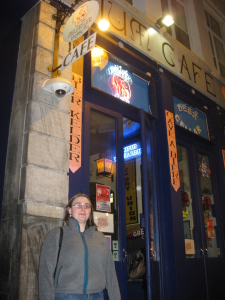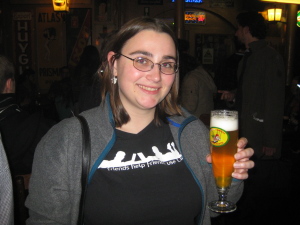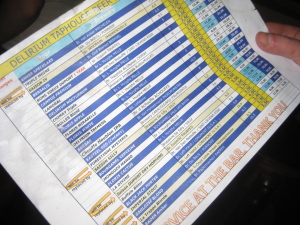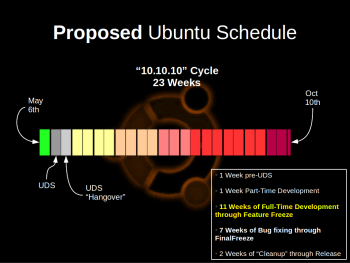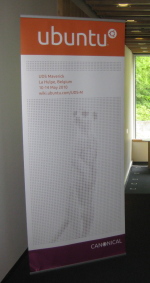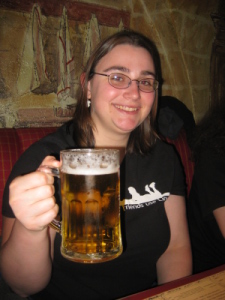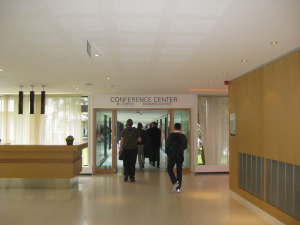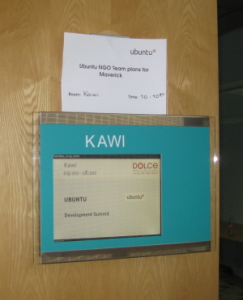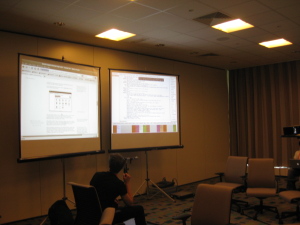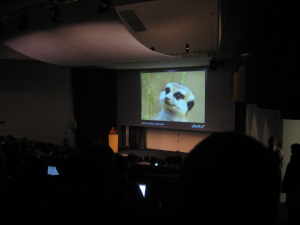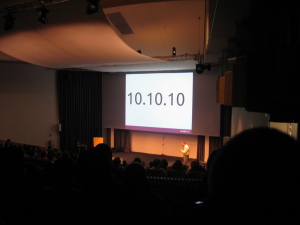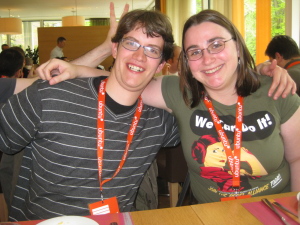And on to day 4…
– Community Roundtable –
First off, Laura Czajkowski explained the LoCo Council healthcheck, a series of monthly Q&A sessions on IRC where the LoCo Council is available to answer questions from the community. The rest of the session was spent on smaller topics, including calendars on fridge, the idea of documenting “what they should be doing” with regard to monthly reporting, team meetings and other things that Approved teams are expected to do.
– Maverick LoCo Directory Plans –
On the LoCo Directory currently it’s a bit difficult to find specific events near you since they are all just in a big list, so we discussed some soon to be released improvements and other mechanisms for handling this. Also discussed were ways to make the team information page richer, perhaps having photos/flickr feed and an easy way to visualize special events the team is participating in (release parties, global jams, etc). There are also a lot of loco-directory bugs out there which have great ideas. Jono also proposed having a map on the front page to quickly get people to a list of teams in their continent. I’m really looking forward to all of this, the loco directory has a lot of potential to make things considerably easier for teams and attendees.
– Maverick Governance Changes And Needs –
The session began with a quick generation of the list of expiring members during the Maverick cycle so we could schedule restaffing. There was also a lot of discussion about handling leadership mailing lists since it’s a tedious process to keep them updated after restaffing and the way in which voting is handled within the community, as launchpad voting is pretty basic and the current methods of extracting information from launchpad for use in 3rd party voting software are not easy for a typical user.
– Maverick IRC Council Plans –
Jussi Schultink lead this session which began with a review of the Lucid RoadMap where he discussed the progress made in that cycle. I’ve been really impressed with the transformation of the council in this cycle and their willingness to tackle the tough problems out there, it was a pleasure to see every one of my questions regarding their status answered in a positive manner where they had either solved a problem or had plans in place. For Maverick they’ll be focusing on the issue tracker (they are asking for volunteers to help), working through the logistics of a “core ops” team and a policy on factoid changes. There was also a lot of discussion about bots, and the following were mentioned/proposed: Reminder that all Ubuntu bots should be added to https://wiki.ubuntu.com/IRC/Bots (including LoCo bots – oops, this needs to be done for California!), a request to be issued that all approved LoCo teams have an official log bot, and a discussion to begin on the policy of having all #ubuntu-* logged (with case by case exceptions). In all, a very productive session.
After lunch I attended the Plenary talk by the new Debian Project Leader, Stefano Zacchiroli, titled “Collaboration with Ubuntu (from the Debina point of view)” (video). It was an excellent talk and he was really keen on seeing the collaboration issues pointed out, discussed and resolved. Hurrah Debian!

I then had to scoot out to be interviewed by Amber Graner, the video is now up up the blip.tv site: UDS-M Interview Elizabeth Krumbach Community.
After the interview I headed back to the auditorium for the group photo, a “quick version” of which has been posted here: http://www.flickr.com/photos/kwwii/4610334160/.
– Ubuntu LoCo Manual –
A couple of really key things came out of this session which was led by Alan Pope and Laura Czajkowski. The first that quickly became clear was that the wiki has a wealth of information which even key members of the community have a tough time keeping track of, discussions would begin and then someone would pull up some old wiki page which would begin to outline the ideas being discussed. This information will have to be found and improved upon. The second important thing that came out of this session was the need for a “Best Practices for a LoCo” which would be a simple checklist outlining the expectations for teams who are approved or seeking approval, since a lot of teams end up getting stuck at a “We have our LoCo set up, now what are we supposed to do?” position.
– Maverick LoCo Council Plans –
This session covered some of the work the LoCo Council has been doing in the past cycle, including embarking upon reapproving teams (which is planned to be done every 2 years). They also discussed the way that news is delivered to LoCo teams, as currently the information is sent to loco-contacts to be shared with teams, but not all LoCo leaders are not sending along that information. Possible solutions were proposed including more direct engaging of LoCo contacts with direct mailing (a lot of work) or having a LoCo Council email address which can email all LoCo team lists (could be controversial). In all, the LoCo Council is doing very well, it’s not easy resolving issues within the community and getting folks to sit down together and talk through problems, but they have been quite successful in finding positive resolutions.
– Ubuntu Manual, Docs Team and Learning project collaboration –
I wasn’t quite sure what to expect from this session since we weren’t sure of the dynamics of the audience going in, and had a backup plan if the members of the Doc Team were unable to attend. To our pleasant surprise, not only was it a full room of folks interested, we had Doc Team representatives present! Currently there are three visible projects within the community seeking to write content for users, in three slightly different formats. It’s been difficult to sync these efforts and this session lead by Learning Materials Team member Martin Owens was a step in the right direction. Phil Bull from the Doc Team joined us via IRC and we discussed a proposal for a “content pool” which includes material from all projects written in the format the Doc Team releases in (currently DocBook, but Phil indicated that they’d probably be switching to Mallard, following Gnome). The Learning Materials project is seeking to continue development on tools for this content pool, primarily being Martin’s Ground control and a collaborative editor for materials, and I’ll be converting the current Learning Material documents to the new format once the Doc Team confirms their position on DocBook vs Mallard. The Manual project will be focusing on a content delivery system for the content they’re releasing in the form of the support and learning center that was discussed earlier in the week, this system will include infrastructure for easily accepting contributions. I have to say that I’m really excited about this collaboration, first because it’s so nice to see the teams starting to work together, and secondly because of the great potential these projects have to help each other.
The day wrapped up and we decided to head down to Brussels for waffles! We took one of the shuttles down into the city center and began our journey by stopping at a couple chocolate shops, yum! I was so close to buying to Duvel made out of chocolate (decided against it since it was unsealed and I wasn’t sure how I’d get such a thing home, darn!).

Then it was off for the actual Belgian Waffles! I ordered mine with strawberries and chocolate, but Martin Bogomolni ordered his with some liquor that was lit on fire when presented at the table, and two other guys followed his lead, and I took a video of it Wow, nice!

Afterwards, we too a walk through the Royal Galleries of Saint-Hubert, a long shopping arcade where everything was closed for the evening but the place was beautiful. Then I hit a local tourist shop for some little gifts and then headed over to get some frietes! I sure did look like a tourist at this point, much to the entertainment of my fellow travelers.

Where now? On our way to get beer I passed a shop window where they had a stuffed toy Delirium elephant, oh how cute! But the shop was closed! Martin gave me some tips on finding one in San Francisco, so we’ll see how that goes. We then got to see the Grand Place where I got some surprisingly good night photos from my trusty little pink handheld canon.


Sufficient number of photos taken, we then made our way to Delirium Cafe – yep, the same place we had spent the last night at. I had a couple new lambics, including the Floris Cactus, but I’ll cover beers in their own post.

We got back at the hotel by shortly after midnight – quite a bit more reasonable than the previous night!













